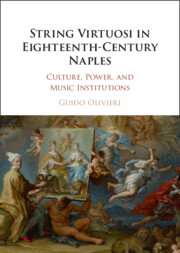Book contents
- String Virtuosi in Eighteenth-Century Naples
- String Virtuosi in Eighteenth-Century Naples
- Copyright page
- Dedication
- Contents
- Figures
- Tables
- Music Examples
- Acknowledgments
- Introduction
- 1 Music Institutions in Naples
- 2 The Formation of the Neapolitan String Virtuosi
- 3 Cello Virtuosi
- 4 Between Naples and Paris
- 5 Neapolitan Virtuosi in the Public Sphere
- 6 Neapolitan Instrumental Music under the Austrian Domination
- 7 Under the Wings of the Imperial Eagle
- Epilogue
- Bibliography
- Index
3 - Cello Virtuosi
Published online by Cambridge University Press: 13 January 2024
- String Virtuosi in Eighteenth-Century Naples
- String Virtuosi in Eighteenth-Century Naples
- Copyright page
- Dedication
- Contents
- Figures
- Tables
- Music Examples
- Acknowledgments
- Introduction
- 1 Music Institutions in Naples
- 2 The Formation of the Neapolitan String Virtuosi
- 3 Cello Virtuosi
- 4 Between Naples and Paris
- 5 Neapolitan Virtuosi in the Public Sphere
- 6 Neapolitan Instrumental Music under the Austrian Domination
- 7 Under the Wings of the Imperial Eagle
- Epilogue
- Bibliography
- Index
Summary
Two forgotten manuscript sources provide new insights on the early history of cello repertory and performance practice in Naples. The first collection, held by the library of the Montecassino Abbey, dates from around 1699 and contains the only two cello sonatas attributed to Giovanni Bononcini, together with the largest set of passacaglias for cello by the Neapolitan virtuoso Gaetano Francone, and the twenty-eight sonatas for two “violas” and elaborations over antiphons by Rocco Greco, a prominent string performer and teacher. This remarkable source presents significant insights on the history, nomenclature, and function of bass violins in Naples and offers new evidence on the practice of continuo realization at the cello. The second source contains the earliest Italian cello method, written around the 1740s by the Neapolitan cellist Francesco Paolo Supriani, and presents examples of elaborate improvisations at the cello. Both sources demonstrate the technical advancement of the Neapolitan cello virtuosi and connect the cello repertory to the partimento practice. The chapter provides entirely new perspectives on the early history of the violoncello and illustrates the emergence of a celebrated generation of Neapolitan cello virtuosi of international repute, such as Francesco Alborea, in the early years of the eighteenth century.
Keywords
- Type
- Chapter
- Information
- String Virtuosi in Eighteenth-Century NaplesCulture, Power, and Music Institutions, pp. 82 - 120Publisher: Cambridge University PressPrint publication year: 2023



